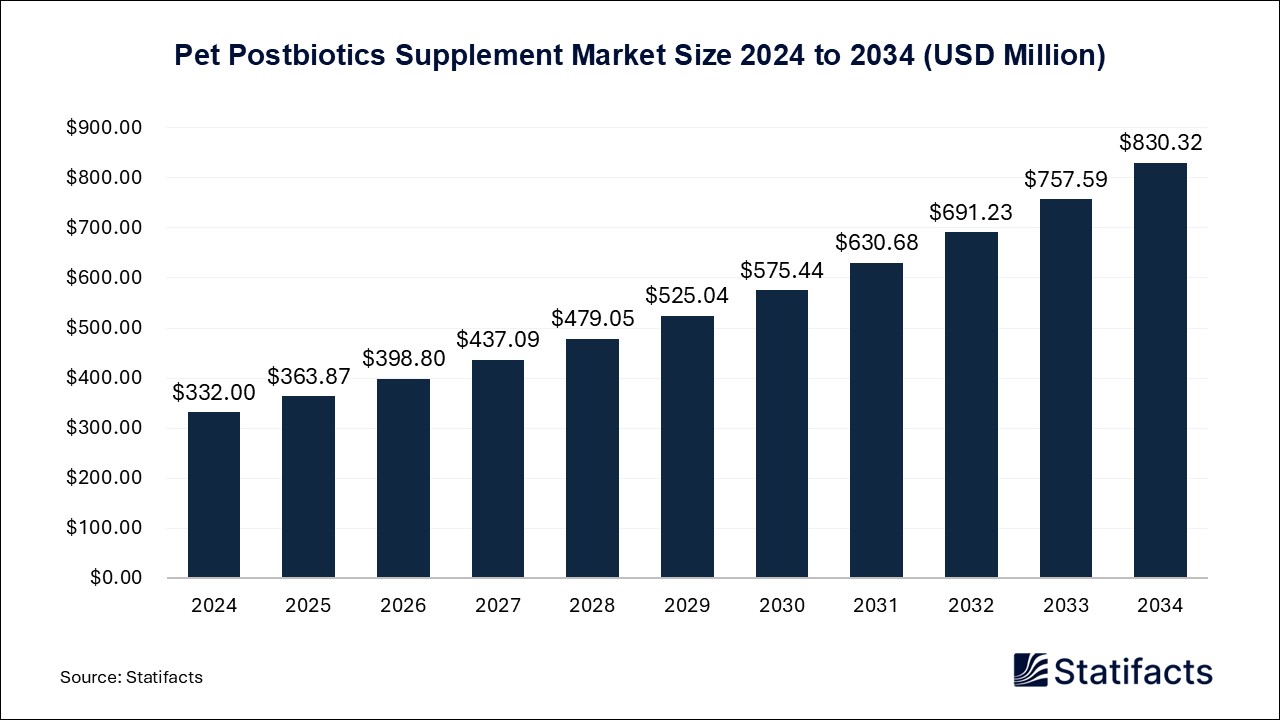Last Updated: 04 Jul 2025
Source: Statifacts
By clicking “Accept All Cookies” you agree to the storing of cookies on your device to enhance site navigation, analyze site usage, and assist in our marketing efforts.
Privacy PolicyThe global industrial biotechnology market size was estimated at USD 585.1 million in 2024 and is projected to be worth around USD 1467.82 million by 2034, growing at a CAGR of 9.63% from 2025 to 2034. Industrial biotechnology plays a significant role in the global market and is growing quickly because of increasing demand for more sustainable, bio-based alternatives in a variety of applications that affect multiple sectors, including energy, chemicals, agriculture, and manufacturing. North America is the leader in market share ownership, due to research and development infrastructure, while the Asia-Pacific is the fastest growing region in the industrial biotechnology market, mainly because of the growth in industrialization, and applied government support.
| Industry Worth | Details |
| Market Size in 2025 | USD 628.39 Million |
| Market Size by 2034 | USD 1467.82 Million |
| Market Growth Rate from 2025 to 2034 | CAGR of 38.83% |
Introduction Industrial biotechnology is the use of biological systems, microorganisms, or enzymes in manufacturing products such as biofuels, biodegradable plastics, bio-based chemicals, and enzymes for use in the manufacturing of industrial products. This innovative technology adds to the efforts of reducing dependence on fossil fuels and decreasing carbon emissions by enabling sustainable alternatives in agriculture, textiles, food processing, energy, and pharmaceuticals. Industrial biotechnology products are used in biodegradable packaging, crop protection, industrial detergents, and medical facilities.
CRISPR-based gene editing has expanded the scope of the current capabilities in producing high-performing microbial strains for specific applications, as well as relying on specific microorganisms in the process. Employing CRISPR bio-manufacturing enables scientists to successfully design and determine the correct organisms used, improve the performance of enzymes, and design resistant organisms to stressors specific to a defined process. With growing applications available worldwide with a strong innovation pipeline, industrial biotechnology is positioning itself as a key driver for the world's transition to a circular, sustainable economy.
Artificial Intelligence (AI) technologies are currently revolutionizing the industrial biotechnology market by accelerating some of the most complex biological procedures. Machine learning and other algorithmic cognition techniques analyze genomic and proteomic data to optimize microbial strain selection and improve bio-product yield. AI-driven platforms by companies like Zymergen and Ginkgo Bioworks have enabled automated and accelerated strain development, while AI was also used for predictive modeling and simulation of fermentation product outcomes, in order to decrease experimental timescales. For instance, DeepMind’s AlphaFold is driving complex breakthroughs in protein structure prediction and may enable certain new avenues to engineer enzymes, too. By incorporation of AI, the industry has an opportunity to increase investments in research and development, additionally lowering costs and shortening the time-to-market for bio-based products.
Rising Demand for Bio-based Products The global changes that are taking place towards sustainable development are creating a growing demand for bio-based products in multiple sectors. Governments, corporates, and consumers around the world with environmental ambitions are embracing industrial biotechnology as a solution. According to the Sustainable Development Goals, bio-based options, including biodegradable plastics, biofuels, and biochemicals, are increasingly becoming a solution because they have less environmental impact than petroleum-based products. Companies in high consumption sectors, including packaging, automotive and construction, and agriculture, are replacing synthetic chemicals and plastics with renewable and biodegradable alternatives.
Legislations in support of bio-based production, such as the EU’s Green Deal and the U.S. Renewable Fuel Standard, create momentum. There is a commercial responsibility for corporations to address sustainability targets, and consumers are increasingly aware of and demanding bio-based products. There is also momentum for bio-based production models through circular economy shifts, which involve treating waste as a resource made actionable by biotechnology. Considering all these reasons together, industrial biotechnology market development will continue, with bio-based product development to be foundational momentum in the development and growth of industrial biotechnology.
Technological Advancements in Fermentation and Enzyme Engineering The advancements in fermentation engineering and enzyme engineering are improving the capability to scale, enhance efficiencies, and enable the effectiveness of industrial biotechnology. Precision fermentation technology allows for the sustainable production of proteins, enzymes, and metabolites based on engineered microbes in controlled environments where there can be a variety of input scales. In addition, this improves the construction of complex molecules, which would be difficult to produce chemically.
Technology developments like continuous fermentation combined with high cell density cultivation or storage will improve productivity, greater yield realization, and shorter timescales. As for enzyme engineering, there are multiple methods being used, including directed evolution, protein modelling, etc., which will lead to engineered enzymes that can provide greater utility in industrial use conditions. Another benefit of using engineered enzymes is that they can be designed to act on a number of biomass feedstocks that provide opportunities for processing options and lower processing costs. Enzymes have been developed into an application for laundry detergents, textiles, paper processes, and biofuels. This innovation decreases the overall cost of bio-based manufacturing with the intent of offering a product or service that would be more competitive in relation to existing products or services.
High production and Infrastructure Costs Although industrial biotechnology provides some climate mitigation alternatives, the availability and utilization of industrial biotechnology (due to many of its barriers with regards to equity, lab to industrial scale production, etc.) will be limited because set up costs, operations, and supply chains are currently high. Many small and start-up companies will find the initial investment into biomanufacturing operations (including facilities, bioreactors, and advanced analytical equipment) cost-prohibitive, regardless of available funding. Additionally, microbes and enzymes for specific industrial applications require extensive development and optimization, which can become a significant expense and resource commitment. Even after all this development and optimization, operational costs tend to be high due to the conditions that need to be controlled during the fermentation or enzymatic reaction process, such as temperature, pH, and sterile conditions for fermentation.
Furthermore, the transition from lab scale to industrial scale incurs additional expenses and risks that companies face in terms of achieving a successful scaling-up experience, since yield can be highly variable or latent time (towards commercial scale-up) can be long or linger for more time than expected. Adding its own constraints to scale up, companies typically face sourcing biomass feedstocks, as those can be unfavorable as a consistent, reliable, good, or productive geographical location that can also experience seasonal impacts on supply chains, which can negatively affect production economics. For as long as fossil-fuel-based capital replacements remain less costly and readily available, industrial biotechnology solutions will continue to fall behind in large-scale adoption in cost-sensitive markets and in general market penetration.
Regulatory Challenges and Intellectual Property Issues The industrial biotechnology market is subject to complicated regulatory environments, which can be very different in nature depending on the region. The regulatory clearance for most products involving genetically modified organisms (GMOs) or synthetic biology takes time to obtain and contributes to product and compliance costs for companies. These regulatory environments differ significantly in degree of biosafety, environmental impact, and consumer protection in terms of health risks among countries, and it is the companies that want a global footprint that have to navigate these challenges.
Furthermore, the nature of the development process for biotechnological applications is evolving so quickly that existing regulations often cannot keep pace; there is considerable uncertainty about the product category of a product, and overall regulatory oversight for a product is lacking if the regulation is not developed or is being developed. IP barriers restrict commercializing and innovating even further if the key technologies are locked up in patents from players that are able to obtain patents, especially large corporations and universities. Smaller firms may really only have the option to seek licensing agreements for technology or defend their own innovations, which slows down their growth in a competitive environment. The lack of harmonization of biotechnology laws and standards globally and the regulatory environment make it difficult to work together across jurisdictions when it comes to innovation and exporting. Biotech firms generally experience a lot of difficulty scaling their market presence because of these regulatory and IP barriers.
The global demand for climate resiliency and the move towards the circular economy are presenting fresh opportunities for industrial biotechnology, particularly for developing nations (and regions and sectors). Countries across Asia, Africa, and Latin America are investing heavily in renewable innovations to develop an expanding industrial economy and address potential economic discrepancies while creating environmental, social, and economic sustainability. Industrial biotechnology serves as a pathway to develop fuels, materials, and chemicals utilizing ambient biomass and agricultural waste products, while reducing reliance on imports and promoting the rural economy.
Acceptations from consumer experience, in addition to existing processes, new innovation relying on advances in synthetic biology, bioprocessing, and precision fermentation offer a new set of options for creating new proteins, bio-based and biodegradable derived materials for applications in agricultural, food, environmental, building, cosmetics, and aerospace enhancement, or injectable antibiotics, to name a few, with ambitions that offers unlimited opportunities for significant economic improvements provided the right policy and support.
"This partnership reinforces our commitment to supporting Australian life sciences companies as they scale their businesses globally. By working together with AusBiotech and Australia's scaleups, we can create even more opportunities for the sector to expand and thrive."
"I am thrilled to lead this dynamic new organization. This merger solidifies our position in the industry as the most reliable and client-centric end-to-end CDMO for the global biopharmaceutical and small molecule industry."
Biomanufacturing dominates the industrial biotechnology market due to its application in many industries, including pharmaceuticals, chemicals, and biofuels. This allows for the ability to manufacture bio-based materials via engineered microorganisms and provides more sustainable alternatives to products derived from petrochemicals. Biomanufacturing is a process that is commonly utilized to manufacture enzymes, amino acids, organic acids, and bioethanol at a commercial scale. The continued demand for clean production methods and sustainable manufacturing, supported by government subsidies, has made a great contribution to the growth of the biomanufacturing industry. Developments in bioreactors by design, process optimization technologies, and other infrastructure have resulted in more efficient processes at lower costs and established biomanufacturing's dominance in the marketplace.
Microbial engineering is the fastest-growing segment due to the ability to engineer microorganisms to suit specific industrial uses by producing higher-value chemicals, biofuels, and biodegradable plastics. Advancements in research with CRISPR-Cas9 and synthetic biology have provided the ability to engineer microbial strains to improve yield and product specificity by modifying metabolic pathways. This means that a company can produce the product quicker, at lower costs, and possibly with alternative feedstocks like industrial waste. There is a demand for engineered microbes for pharmaceuticals, agriculture, and bioremediation, which dramatically increases the amount of investment and focus on segmentation. In addition, the growth potential of the segment is also driven by climate-resilient demands in key sectors of sustainable development, establishing microbial engineering as a viable tool for development for the future of industrialization.
North America
North America dominates the global industrial biotechnology market with its network of research and development institutions, biotechnology start-ups, and industries. North America also has a favorable institutional framework for innovative research, including options for public-private partnerships and a favorable regulatory environment. For instance, the U.S. government has various pledges of funding programs and various supportive policies, such as the BioPreferred program and incentives to manufacture biofuels. The U.S. has several key industrial actors, including DuPont, Amyris, and Genomatica, who will incentivize and inspire innovations in this region. For instance, Genomatica has established a commercial relationship with Unilever and L'Oreal to assess the marketplace's interest in sustainable bio-based ingredients, which highlights the active commercial momentum currently happening in this region.
US
The U.S. is anticipated to dominate the North American market given the advancing investment in research and development infrastructure, the overall amount of public and private research and development investment in biotech start-ups, a commitment at the public policy level, and an integrated circular economy. For instance, the U.S. Department of Energy's Bioenergy Technologies Office continues to invest in molecular biosciences research and development to build up a biomanufacturing infrastructure. U.S.-based companies are developing next-generation bioproducts to give them competitive advantages. Engagement and innovation in the commercialization of new products often occur through collaborations between academics and industry. Furthermore, the U.S. venture capital ecosystem is another catalyst for continuous progress in industrial biotechnology.
Asia-Pacific
Asia-Pacific is expected to have the fastest growth within the industrial biotechnology sector due to enormous industrialization, and with increasing focus on renewable energy needs and government interest in green technologies, many nations such as China, India, and Japan are also investing in bio-based manufacturing infrastructure. The region is also achieving successful cooperation on regional collaborative and mutual technology development. In addition, the rising costs of feedstock, sustainable agricultural and chemical inputs, and all the benefits from reduced production costs and ready feedstock biomass availability provide the industrial biotechnology market with tremendous competitive advantages. There is also a rising local market for more biodegradable materials and renewable fuels; therefore, Asia-Pacific is positioning itself as an investment area for industrial biotechnology.
In January 2025, the merger of Australian biotech businesses Biocina and Novacina created one of the largest Contract Development and Manufacturing Organizations (CDMO) in the area, which significantly focuses capacity for cell and gene therapy products, along with stock involving development in CDMO pipelines. The merger has been enabled by a key opportunity to enable Australia to improve its competitive environment for biomanufacturing on a global scale, attract investments, by improve efficiencies in the 'advanced therapeutics' manufacturing space. [Source: https://biotechdispatch.com.au/news/biocina-and-novacina-merger-aims-to-bolster-the-global-cdmo-industry ]
Amgen is a global biotechnology corporation with operations in over 100 countries. The company is a leader in oncology, cardiovascular disease, inflammation, and rare diseases. There are various biologics (e.g., Prolia, Enbrel, Repatha) within Amgen's product pipeline, along with numerous biologics in development, and the company has employed computational scientific research based on artificial intelligence.
Gilead Sciences is an innovative biotechnology company, operating in more than 35 countries, and a leader in virology, oncology, and inflammation treatments. This company offers a portfolio of HIV antivirals (e.g., Truvada, Descovy, remdesivir) and an oncology portfolio with other compounds in development. Gilead is a leader in global access to medicines and is committed to research and development.
Biogen is a biotechnology company focused on neuroscience, which provides multiple sclerosis, Alzheimer's (e.g., Leqembi), and rare neurological disorder treatments. Biogen is a global corporation that has neuromodulation and neurodegeneration within its research and development pipelines.
Published by Rohan Patil
Last Updated: 04 Jul 2025
Source: Statifacts
Last Updated: 04 Jul 2025
Source: Statifacts
| Subsegment | 2024 | 2025 | 2026 | 2027 | 2028 | 2029 | 2030 | 2031 | 2032 | 2033 | 2034 |
|---|---|---|---|---|---|---|---|---|---|---|---|
| Microbial Engineering | 1,980.00 | 2,195.92 | 2,446.38 | 2,737.64 | 3,077.27 | 3,467.22 | 3,932.06 | 4,478.90 | 5,134.71 | 5,900.12 | 6,815.71 |
| Biomanufacturing | 2,057.00 | 2,264.96 | 2,505.20 | 2,783.38 | 3,106.27 | 3,489.26 | 3,928.76 | 4,443.13 | 5,036.40 | 5,745.81 | 6,577.11 |
Last Updated: 04 Jul 2025
Source: Statifacts
| Subsegment | 2024 | 2025 | 2026 | 2027 | 2028 | 2029 | 2030 | 2031 | 2032 | 2033 | 2034 |
|---|---|---|---|---|---|---|---|---|---|---|---|
| Microbial Engineering | 1980 | 2,195.92 | 2,446.38 | 2,737.64 | 3,077.27 | 3,467.22 | 3,932.06 | 4,478.90 | 5,134.71 | 5,900.12 | 6,815.71 |
| Biomanufacturing | 2057 | 2,264.96 | 2,505.20 | 2,783.38 | 3,106.27 | 3,489.26 | 3,928.76 | 4,443.13 | 5,036.40 | 5,745.81 | 6,577.11 |
Industrial biotechnology involves using biological systems—such as enzymes and microbes—for industrial processes, including the production of biofuels, bioplastics, enzymes, and other bio-based chemicals.
Growth is fueled by rising demand for sustainable and eco-friendly manufacturing, advancements in synthetic biology, and increasing government support for bio-based alternatives to fossil-fuel-derived products
Key applications include bioenergy (like bioethanol and biodiesel), biodegradable plastics, biopharmaceuticals, agricultural inputs, and environmental remediation through waste conversion.
Challenges include high R&D and production costs, scalability issues, competition with traditional petrochemical products, and regulatory complexities across regions.
Major companies include DuPont, Novozymes, BASF, Amyris, and Genomatica, along with several emerging biotech firms focused on enzyme technology, bio-based chemicals, and renewable feedstocks.
To get full access to our Market Insights, you need a Professional Account or a Business Suite.

You will receive an email from our Business Development Manager. Please be sure to check your SPAM/JUNK folder too.

You will receive an email from our Business Development Manager. Please be sure to check your SPAM/JUNK folder too.

Our customers work more efficiently and benefit from



